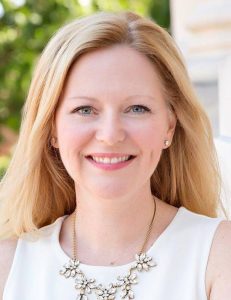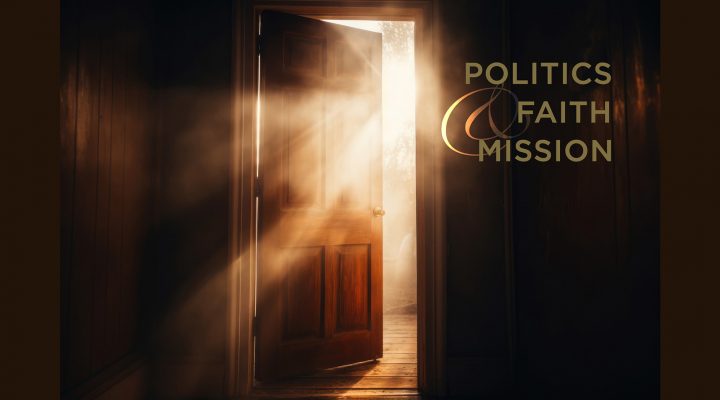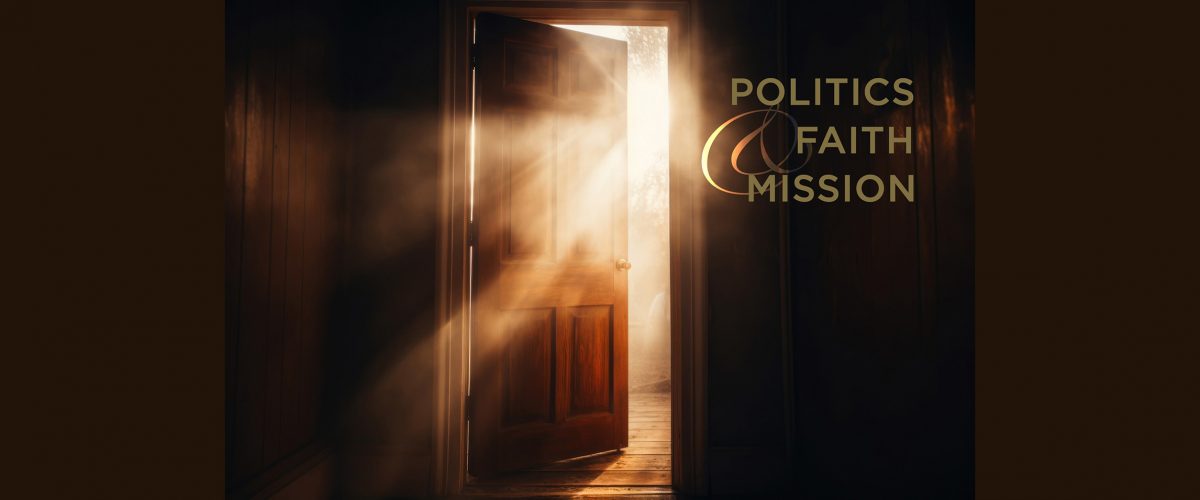Melissa Deckman is a political scientist studying gender, religion and American politics. The author of the wondrous new book The Politics of Gen Z: How the Youngest Voters Will Shape Our Democracy from Columbia Press, she also is CEO of Public Religion Research Institute and works closely with PRRI founder Robert Jones, who spoke with us in September. I’m so grateful to her for responding to my questions in the midst of one of her and PRRI’s busiest times — the closing days of a general election.
Greg Garrett: The Politics of Gen Z documents and explains what feels like a sea change in American politics. Can you summarize for my readers the major shifts you write about and what issues Gen Z seems to be most passionately supporting?
Melissa Deckman: In The Politics of Gen Z, I argue that gender is critical to understanding the political views and habits of this nascent generation, members of whom are typically described as Americans born after 1996. During the Trump years, for the first time in American political history, young women were more likely to engage in political activities than young men.

Melissa Deckman
This “reverse” gender gap in terms of political engagement levels among Gen Z women and men can be explained by both political and cultural factors. Generation Z women came of age politically as Donald Trump was elected president. Many Gen Z women I spoke with were shocked that the United States would elect an outspoken misogynist, particularly over the highly qualified first major-party female nominee.
In 2018, record numbers of younger and more diverse female candidates, such as Alexandra Ocasio-Cortez, had a profound role-model effect for many young women, too. Gen Z women also came of age as the MeToo movement highlighted persistent problems with gender discrimination in society, which had the effect of prioritizing gender equality as a defining political value for many Gen Z women.
Indeed, while the term “feminist” often brings some baggage with it, my data show Gen Z women are far more comfortable describing themselves as such, and at much higher rates than older women.
“Gen Z is a generation defined by what they view as major existential threats.”
But the surge in young women’s progressive activism relative to young men is also rooted in important cultural changes. In the past few decades, a larger, communal sense has emerged that girls and women continue to face disadvantages in society, and programs have been implemented to tackle those disadvantages and build young women’s self-esteem. One need look no further than popular organizations such as Girls Who Code, Girl Scouts, Girl Up, or a host of similar groups founded in local communities around the country that have developed programming to train girls to become leaders in politics, business or science-related fields. Combined with the explosion of social media — another cultural milestone — many progressive Gen Z women have had the drive and ability to organize effectively as political activists in ways that previous generations of women could not.
In addition to gender equality, however, Gen Z is a generation defined by what they view as major existential threats, particularly climate change and gun violence. Often described as “the lock-down generation,” the influence of the horrific shooting at Majorie Stoneman Douglas in Parkland, Fla., spawned the March for Our Lives Movement. Most young activists I interview in the book, many of whom would go on to form their own youth-led organizations, said their first political activity involved participating in a March for Our Lives rally or youth-climate strikes.
Finally, the Dobbs decision has once again served to motivate many young women, who my organization, PRRI, finds are among the most staunchly supportive of abortion legality compared with other Americans. Notably, most Gen Z men lean progressively in terms of many policy views, but their views are not as liberal as their female counterparts, nor do those liberal values propel them to engage at higher levels of politics overall.
GG: You point out that Gen Z voters and activists are standing up in active opposition to old white guys. When Joe Biden stepped out of the presidential race, how did that change how Gen Z voters engaged with the presidential race? What might this mean for future elections?
“This generation of young women is hungering for political change and for a more inclusive democracy and political system with leaders who look like them.”
MD: Most Gen Z women I spoke with clearly expressed impatience with the political status quo, embodied for them by a bunch of “old white guys.” I joked with my publisher that we should call the book by that name, because that expression — “no more old white guys” — came up repeatedly. Simply put, this generation of young women is hungering for political change and for a more inclusive democracy and political system with leaders who look like them.
In the 2020 election, roughly two in three women aged 18 to 29 voted for Joe Biden, as did 52% of young men, according to exit polls. But it was clear in the past year that few Americans, especially younger Americans, were excited about Trump or Biden being their parties’ presumptive nominees, and younger people particularly felt Joe Biden was too old to be president.
With Kamala Harris’ entry into the race, however, we have seen a huge increase in enthusiasm among most Democratic voters, especially younger women. The biannual Harvard Youth Poll, for instance, found that among voters aged 18 to 29, “more than four-in-five (81%) of Harris supporters in a direct match-up with Trump are enthusiastic about voting for her, nearly doubling the 43% of Biden supporters who said the same in March.” The poll also found on the issues Gen Z has consistently prioritized, such as climate change, abortion and preventing gun violence, Gen Z voters — particularly likely voters — give Harris an edge.
But it is also notable that many young people who support Harris are more likely to say they back her not because of her race or identity but because they agree with her policy positions. There is also a palpable sense from many Zoomers she has a much better shot of defeating Trump than Biden did.
Now, no generation of voters is politically monolithic, and some data suggests Trump is making inroads to younger male voters compared with 2020, and his campaign has been trying to reach them on the social media platforms they tend to populate. But my book shows very few Gen Z women identify as Republican.
GG: The word “intersectionality” seems to come up a lot as you think about how Gen Z understands themselves and each other. How do gender, race and sexuality, among other things, shape these young voters, and how might their concerns for all whose “rights are on the line” shape or reshape American life?
“Gen Z is the most diverse generation in terms of race and ethnicity and in terms of LGBTQ status.”
MD: It is important to realize Gen Z is the most diverse generation in terms of race and ethnicity and in terms of LGBTQ status. And that very diversity, I argue, shapes their political values and leads them to be more engaged in politics.
For instance, about one in four Zoomers are queer; among Gen Z women, that level rises to about one in three. The process of navigating their own gender identities and sexual orientations has prompted many LGBTQ Gen Z young adults to take political action, particularly because state legislatures in more conservative states have been curtailing rights for LGBTQ citizens and have adopted curriculum changes in some schools that omit references to LGBTQ Americans.
As a result, I find LGBTQ Zoomers are also outperforming their straight counterparts in terms of overall levels of political engagement in my survey data.
For many Gen Z women of color I spoke with, the fight for racial equality as embodied in the Black Lives Movement cause has been paramount to their decision to participate in politics; they often noted they feel very compelled to engage in gun violence prevention movements as gun violence disproportionately impacts communities of color.
Notably, though, my data show both white and nonwhite Gen Z women are just as likely to share a deep commitment to racial justice, and a strong commitment to racial equality leads them to be more active in politics than those Gen Z women who do not share such a commitment.
More important, though, I’d add there is growing recognition among the nation’s youngest generation that using a lens that considers multiple identities of marginalization, not merely gender, race or LGBTQ status alone, but the intersection of these identities, is important to addressing political problems and finding political solutions.
GG: Late in the book, you use the term “demographic doom” to talk about how the majority of Gen Z relate to the Republican Party. Can you explain what you saw — and are seeing — about how young voters regard the right?
MD: To be clear, no generation is politically monolithic — my book features interviews with Gen Z political activists and focus groups from across the political spectrum — but the highest levels of political activism being undertaken by this generation are in progressive spaces.
Moreover, my book and recent work undertaken by my PRRI shows fewer than one in five Gen Z women identify or lean Republican in their orientation.
In the last three federal elections held since Donald Trump was elected president, the youth vote — led by Gen Z women — has broken hard for Democrats. Of course, there is no guarantee that Zoomers, including Gen Z women, will flock to the Democratic Party in all future elections.
“It is hard to see how the Republican Party reaches young women or LGBTQ Zoomers as voters, given the issues that animate its older, whiter and more religious base.”
Our work at PRRI, for instance, finds a deep mistrust of political institutions, including our two major politics parties, among this generation. Democratic leaders will certainly have to work hard to appeal to these future voters as well and can’t assume those voters as given. But, again, it is hard to see how the Republican Party reaches young women or LGBTQ Zoomers as voters, given the issues that animate its older, whiter and more religious base.
How Gen Z men identify and vote moving forward will be an interesting political story to watch, however. There is a growing gender divide emerging among Generation Z with respect to ideological self-identification. But that divide is really explained largely by Gen Z women’s shift toward greater liberal identity — not because young men are becoming more conservative in reaction.
I would describe Gen Z men as being more ideologically diverse, and they often hold left of center positions on many political issues. In 2024, it does appear the Trump campaign may be making some inroads to some young male voters, including potentially young men of color. Yet, while Trump may very well earn more votes among young men than Biden or Clinton did, I don’t think it will be because of his stoking hypermasculine themes that define much of his campaign rhetoric and style. I think Trump’s campaign may make inroads with young men because of the economy and because the Democratic Party hasn’t really done an effective job of messaging to them.
GG: I found your book tremendously heartening, maybe not least because it shows a generation coming along that wants to address many of the issues my generation has been unable or unwilling to solve. Where are you finding hope and joy in your work and in your life?
MD: I left being more hopeful and inspired as a result of writing this book, too. When Gen Z cares passionately about an issue, they have been willing to fight to make effective political change.
I had the pleasure of interviewing Jackie Corin, who is a Parkland survivor and who co-founded March for Our Lives. Within hours of that shooting, she connected with a family friend who got her in touch with her state legislator, and she helped mobilize 100 students from Parkland to connect with individual lawmakers in the statehouse and former Gov. Rick Scott, a Republican with an A rating from the NRA. The lobbying efforts of Jackie and her Parkland friends paid off as the General Assembly passed and Gov. Scott signed legislation to ban bump stocks, raise the minimum age for buying a gun to 21, and add a three-day waiting period before gun purchases — the first tangible gun control measures to pass in a red state in decades.
Of course, there are still real challenges facing Gen Z, and we find at PRRI, for instance, that levels of mistrust among Gen Z for government and other political and religious institutions are substantially higher than among older Americans. Despite that, we also find at PRRI that Gen Z is just as, if not more, highly engaged in politics than older Americans. I am humbled and inspired by these young people.
In terms of joy, I find that in my family. The mother of two Gen Z young men, watching them navigate the world along with my husband is my largest source of joy. I am fortunate to live near water in Annapolis, so walking our dog and enjoying nature also ranks highly on the list.
Greg Garrett is an award-winning professor at Baylor University, where he is the Carole McDaniel Hanks Professor of Literature and Culture. One of America’s leading voices on religion and culture, he is the author of 30 books, most recently the novel Bastille Day and The Gospel According to James Baldwin: What America’s Great Prophet Can Teach Us about Life, Love, and Identity. He is currently administering a major research grant on racism from the Eula Mae and John Baugh Foundation and finishing a book on racist mythologies for Oxford University Press. Greg is a seminary-trained lay preacher in the Episcopal Church and Honorary Canon Theologian at the American Cathedral of the Holy Trinity in Paris. He lives in Austin with his wife, Jeanie, and their two daughters.
More from this series:
Politics, faith and mission: A conversation with Matthew D. Taylor
Politics, faith and mission: A conversation with Nancy French
Politics, faith and mission: A conversation with Robert P. Jones
Politics, faith and mission: A conversation with Brian Kaylor
Politics, faith and mission: A conversation with Colin Allred
Politics, faith and mission: A conversation with Tia Levings
Politics, faith and mission: A conversation with Linda Livingstone
Politics, faith and mission: A conversation with Samuel Perry
Politics, faith and mission: A conversation with Jimi Calhoun
Politics, faith and mission: A conversation with David Dark
Politics, faith and mission: A conversation with Randolph Hollerith
Politics, faith and mission: A conversation with Jillian Mason Shannon
Politics, faith and mission: A conversation with Bishop Mariann Edgar Budde
Politics, faith and mission: A conversation with Vann Newkirk II
Politics, faith and mission: A conversation with Sarah McCammon
Politics, faith and mission: A conversation with Winnie Varghese
Politics, faith and mission: A conversation with Kaitlyn Schiess
Politics, faith and mission: A conversation with Russell Moore
Politics, faith and mission: A BNG interview series on the 2024 election and the Church
Politics, faith and mission: A talk with Tim Alberta on his book and faith journey
Politics, faith and mission: A conversation with Jemar Tisby
Politics, faith and mission: A conversation with Leonard Hamlin Sr.
Politics, faith and mission: A conversation with Ty Seidule
Politics, faith and mission: A conversation with Jessica Wai-Fong Wong


